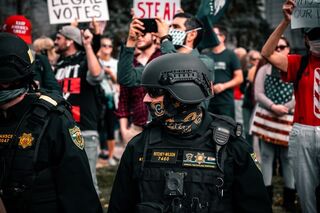Fear
History and January 6th One Year Later
A Personal Perspective: Are we losing our democracy?
Posted January 12, 2022 Reviewed by Lybi Ma

Like many Americans, I have spent the last year preoccupied with the pandemic and the disturbing impact it has had on my professional and personal life. But January 6, 2021, has never been far from my mind. I listen to the Washington Journal on CSPAN most mornings and many Americans call in with claims of election fraud, the assertion that January 6 was instigated by the FBI or Antifa, and that Trump had nothing to do with it. Other callers express disbelief at these assertions and even request the host to refute them. Clearly, we are a deeply divided and traumatized populace.
In my last post, I turned to the events of the French Revolution as an historical analogy. My central point: The attack on Versailles was echoed in the attack on the Capitol because both represented sacred and unassailable spaces of political power suddenly being breached. However, from the perspective of a year, January 6 is appearing more as a key moment in the transformation of our republic into a form of illiberal authoritarianism – just as the March on Versailles and the King’s subsequent flight from Paris marked the turning from a constitutional monarchy to a republic. Political cultures constantly morph, but I fear we are witnessing a revolutionary change similar to the French in the late 18th century.
In her recent address in the Capitol memorializing January 6, Vice President Harris connected the day to Pearl Harbor and 9/11 but failed to mention that those attacks came from outsiders, not Americans. Obviously, there is deep fear and disdain of the federal government in America. Recall Ronald Reagan’s famous quote: “The nine most terrifying words in the English language are: I’m from the government and I’m here to help.” Those were more innocent times, and no doubt Reagan and his progeny would and should be outraged by January 6.
I hoped January 6 would wake up “traditional” republicans. Initially, the statements of republican leaders in congress suggested that it had. But they have since recanted. The claim of election fraud remains, and it is evident that January 6 has provided experience on how to overturn elections and destroy what were once perceived as unbreakable democratic institutions.
After his attempted flight to Varennes, Louis 16th was returned to Paris in the early summer of 1791. Parisians were deeply traumatized. The King had committed treason, but the majority of the people still aspired for a constitutional monarchy. The National Assembly even restored his power under the condition that he agreed to the constitution, even as they knew they couldn’t trust him. They needed him. They wanted to believe in him. Traumatized people often act in inexplicable, irrational ways. On the left the defenders of the republic watch in disbelief, and sometimes in denial, as the republic is dismantled. The majority on the right are also in denial, parroting what their base wants to believe. In April 1792 the King’s powers were disbanded with the commencement of the war with Austria. The French First Republic was declared (France is currently on its 5th and most durable republic – proving political transformations take time) and the King was put on trial for treason and guillotined in January 1793. The vote to convict him was nearly unanimous, though deeply split over whether to execute him.
Similarly, we are at an inflection. Will the instigators be punished for January 6? Will the rule of law and our democratic institutions hold?


